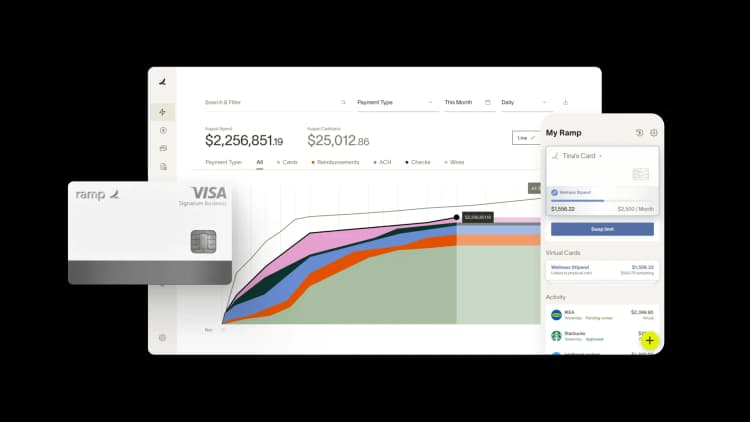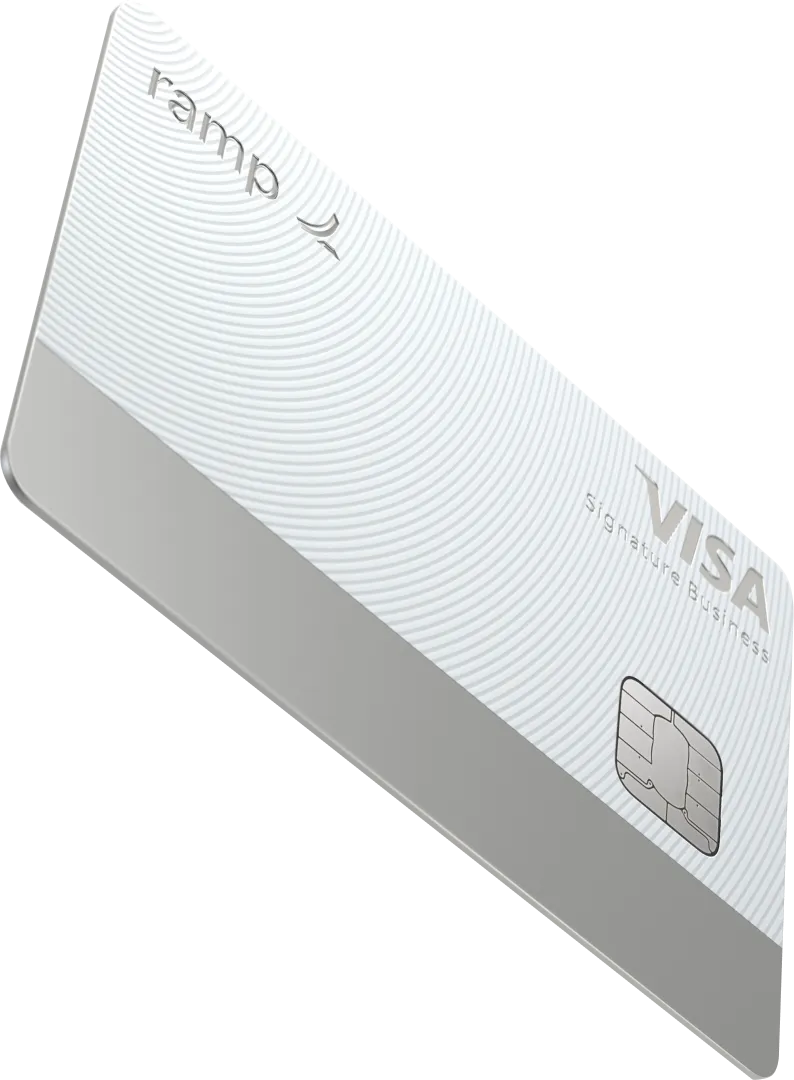What are ghost cards? Benefits, risks, and use cases

- What is a ghost card?
- How do ghost cards work?
- Benefits of ghost cards
- Risks and downsides of using ghost cards
- How to implement ghost cards
- Alternatives to ghost cards
- Ramp: A better alternative to ghost cards

Ghost cards can be a handy way for employees to cover expenses without using your main corporate card. You can assign them to entire departments or use them only for specific vendors. But do ghost cards truly help with expense management, or do they create more challenges for your finance team?
While ghost cards can make expense processes more efficient and boost security, they also have drawbacks you should consider before adopting them. Here, we cover what ghost cards are, how they function, their risks and advantages, tips for implementation, and potential alternatives.
What is a ghost card?
A ghost card is a digital credit or debit card number that a company assigns for specific payments, usually for individual vendors or departments.
Unlike standard corporate cards, ghost cards are entirely virtual and aren't tied to a physical plastic card. One credit account can have multiple ghost cards assigned for various purposes. Each ghost card rolls up to the same bill, whereas if you had multiple corporate cards, you would receive bills for each card.
Department ghost credit cards allow any employee within that group to make purchases with the card number, eliminating the need for expense reimbursement programs. You can also issue ghost cards for suppliers, which allows them to charge the company whenever they process an order.
The terms ghost card and virtual card are sometimes used interchangeably, but they're not quite the same. You assign ghost card numbers to entire business departments, who can use them repeatedly. Virtual cards are unique, one-off tokens generated for single-use purchases, drastically improving fraud protection.
Who uses ghost cards?
The heaviest users are generally large corporations or heavily matrixed organizations, such as those in healthcare, higher education, or government. But any business that makes frequent or recurring transactions could potentially benefit from using ghost cards.
How do ghost cards work?
When requesting ghost cards, you first specify your use case and work out the terms and limits. For example, you might restrict a card to purchases from a single vendor or limit it to $10,000 in purchases. But once the ghost card number exists, it functions like any other digital credit card, with the number often stored directly within procurement tools.
For example, let’s say a sales department has a ghost card to book business travel via a company portal. The card number lives within the portal, with preset transaction limits. When the team books travel, the system automatically codes those charges as travel expenses and assigns them to the appropriate budget.
Every card has an administrator who can adjust defined limits, modify controls, and deactivate cards as business needs change.
You can code every ghost card transaction with metadata for tracking. This can be department ID, project number, or vendor name. The regular billing statement aggregates this information, so there’s just 1 statement for all issued ghost cards, itemized per card. Finance teams can reconcile the charges back to internal budgets based on the metadata from each transaction.
Benefits of ghost cards
If you use them properly, ghost cards can provide an efficient and cost-effective way to manage your business expenses and streamline payment processing. These are some of the benefits:
Centralized department spending
Ghost cards allow you to organize spending by department. Imagine issuing separate ghost cards to marketing, operations, and HR. Since each department's expenses are separated by card, you can quickly and easily track and categorize them.
Itemized expense tracking
Since ghost cards are dedicated to specific teams, projects, or vendors, it’s easy to categorize transactions based on their purpose. The system tags statements to the appropriate category and streamlines the reconciliation process, as your finance team no longer needs to review transactions manually. You can easily match expenses to the appropriate budget or account.
Streamlined vendor payment
Ghost cards also simplify recurring transactions and high-volume vendor payments. Say you have a recurring software subscription. You can easily assign a unique ghost card just for that vendor, which drastically speeds up your monthly reconciliations for the payments.
Likewise, if you expect to have a large volume of transactions related to one vendor, you can set up a vendor-specific ghost card that keeps all payments consolidated in one place. That way, you don’t have to open up new purchase orders each time.
Risks and downsides of using ghost cards
Ghost cards have clear benefits in certain situations, like granting purchasing power to someone in a remote location. But they may not always be a good fit for small business expense management. These are some of the risks and downsides to keep in mind:
Fraud vulnerability
According to the 2025 AFP Payments Fraud and Control Survey Report, 79% of organizations were victims of fraud attacks or attempts in 2024.
If not monitored carefully, ghost cards can put you at risk for credit card fraud. It might start as something minor, such as team members using a ghost card to buy their morning coffee, but it could lead to larger misuse.
Your accounts payable department might not detect this with a ghost credit card. Moreover, former employees may still attempt to use their department’s ghost card even after leaving the company.
No personal spending accountability
Sharing a credit card number with an entire department eliminates personal accountability. It makes it challenging to track who's making which purchases.
Unfortunately, most ghost cards don’t provide the tools to give you that level of visibility. This means you may not catch misuse of company funds until the following budget review.
Overspending risk
It’s impossible to manage costs without spend controls. Decentralized cards don’t always make that easy for you. Ghost cards can lead to budget overruns when employees have unsupervised spending power.
Higher interest rates
Ghost cards often link to your business credit card account, so unpaid balances will accrue at the interest rates of that card. The average interest rate on a business credit card is 21.5% in 2025. So it’s possible you could be paying higher interest rates if you’re not able to pay down the balance each month.
Discover Ramp's corporate card for modern finance

How to implement ghost cards
Once you’ve decided to move forward with ghost cards, follow these steps to implement them in your business:
Step 1: Assess your business needs
Understand your need for ghost cards. Do you want to use these for specific vendors, subscription costs, or employee expenses? Or are you looking to separate spending by client or internal team? The answers to these questions will help you choose the right provider.
Step 2: Choose your providers
Next, research financial institutions that offer ghost cards. Factors to consider include:
- Integration with your existing accounting and expense tracking tools
- Spending controls and limits
- Costs
- Reporting capabilities
Step 3: Set spending controls and policies
Since ghost cards risk overuse, make sure you set both company policies and spending controls on them. You can establish spending limits, expiration dates, and usage restrictions based on vendors or users. You can also monitor usage and look for spending patterns, then adjust your policies and controls as needed.
Step 4: Train your team
Communicate policies to your team so that everyone’s on the same page. Provide training and education on both the value of ghost cards and the limits of their usage.
You'll want to train your team during onboarding, but it’s also valuable to provide ongoing guidance, especially as policies and controls adapt to changing business needs.
Alternatives to ghost cards
There are several alternatives to ghost cards that could fit your business, depending on how many purchases you make each reporting period, the number of people involved in purchasing and expenses, and your business size. Here are some of your options:
- Virtual cards: Modern corporate cards come with spend control features, and many of them allow you to spin up unlimited virtual cards. Like ghost cards, virtual credit cards are also digital-only. You can itemize expenses by user and set expense limits at the individual card level.
- Prepaid cards: A debit card works like a credit card but has a spending limit set by a preloaded balance. Many companies use prepaid cards to control spending or fund special projects. You can load the budget for different projects as needed and “recharge” the card when necessary.
- Expense management platforms: Some corporate cards, like Ramp, come bundled with expense management software. These cards integrate directly with your expense tracking workflow, allowing you to streamline the process from start to finish.
Ramp: A better alternative to ghost cards
The Ramp Business Credit Card is a safe and secure alternative to ghost cards for businesses of any size. It comes with built-in spend controls you can adjust to fit unique situations. You can also request documentation, like itemized receipts, for specific transactions.
Plus, our platform integrates with popular accounting software such as QuickBooks and Xero, and we offer a wide range of perks and pricing intelligence to help your company thrive and grow while saving money.
Ready to learn more? Explore our interactive demo.

“In the public sector, every hour and every dollar belongs to the taxpayer. We can't afford to waste either. Ramp ensures we don't.”
Carly Ching
Finance Specialist, City of Ketchum

“Ramp gives us one structured intake, one set of guardrails, and clean data end‑to‑end— that’s how we save 20 hours/month and buy back days at close.”
David Eckstein
CFO, Vanta

“Ramp is the only vendor that can service all of our employees across the globe in one unified system. They handle multiple currencies seamlessly, integrate with all of our accounting systems, and thanks to their customizable card and policy controls, we're compliant worldwide. ”
Brandon Zell
Chief Accounting Officer, Notion

“When our teams need something, they usually need it right away. The more time we can save doing all those tedious tasks, the more time we can dedicate to supporting our student-athletes.”
Sarah Harris
Secretary, The University of Tennessee Athletics Foundation, Inc.

“Ramp had everything we were looking for, and even things we weren't looking for. The policy aspects, that's something I never even dreamed of that a purchasing card program could handle.”
Doug Volesky
Director of Finance, City of Mount Vernon

“Switching from Brex to Ramp wasn't just a platform swap—it was a strategic upgrade that aligned with our mission to be agile, efficient, and financially savvy.”
Lily Liu
CEO, Piñata

“With Ramp, everything lives in one place. You can click into a vendor and see every transaction, invoice, and contract. That didn't exist in Zip. It's made approvals much faster because decision-makers aren't chasing down information—they have it all at their fingertips.”
Ryan Williams
Manager, Contract and Vendor Management, Advisor360°

“The ability to create flexible parameters, such as allowing bookings up to 25% above market rate, has been really good for us. Plus, having all the information within the same platform is really valuable.”
Caroline Hill
Assistant Controller, Sana Benefits



